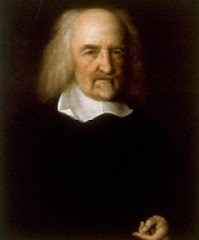Monday, June 16, 2008
Women and lesser animals
It seems that Hobbes accords some fairly robust natural equality to women on the ground that they are sufficiently equal in strength and wit to men that arrangements between the sexes will have to be consensual. He says that dominion over children, in the absence of any express contract, resides in the mother because only she can declare who the father is. (Doesn't this seem like a terrible argument?) But he allows that non-human animals may permissibly, under the law of nature, be used (if they are tameable and useful) or killed (if they are noxious), not on Humean grounds that they are too weak to merit considerations of justice, but (it seems) on the ground that they would be unfairly advantaged if we were morally required to refrain from killing them while they were given moral impunity to kill us. Does this position make any sense?
Subscribe to:
Post Comments (Atom)

4 comments:
The "unfairly advantaged" idea is a bit silly--as though the human species would be wiped out by the animal world--but the more general implied point seems comprehensible: what motive do I have to accept a moral obligation to another who doesn't grant the same obligation to me? Humans _could_ choose not to eat yet to be eaten, but why should they (without appealing to a non-Hobbesian kind of ethical framework, of course)?
I’m not sure that Hobbes’s argument that dominion over children resides in the mother is so terrible. He seems to have in mind his idea that if someone has the power to determine who is sovereign, then the person who has that power of determination is the actual sovereign, unless or until he or she relinquishes that power by transferring the sovereignty. If the mother can effectively deny any purported father’s claim to dominion, then she has control over the would-be sovereign, i.e. she is the actual sovereign.
On the main point, wouldn’t the Hobbesian construal be that humans can always kill or domesticate animals because humans have a natural right to do whatever they judge conducive to their self-preservation? A natural right can only be alienated by covenant or contract; there can be “no covenant with beasts” (Lev. 14.22); therefore between them animals and humans have no obligations that infringe on the state of nature situation in which they are allowed to do whatever they judge fitting for their own preservation. I commit no more wrong in killing the lion than the lion commits in killing me.
Surely those who can determine who has power need not themselves have power. The 5th justice of the Supreme Court who tipped the scale in 2000 as to who would be president did not thereby exercise the powers of the president.
But back to the main point, CK's concern that humans have no motive to accept obligations toward lesser animals because they cannot reciprocate, I worry that the requirement of reciprocation is too strong. Human infants cannot reciprocate, and never will, unless we extend them a huge courtesy (for which they will owe us forever.) That is the Humean idea of justice.
To Kinch's point, it is true that humans can have no contractual obligations to beasts, but that doesn't mean that they can have no natural duties (for instance to refrain from cruelty) toward beasts. By the right of nature they are permitted to do whatever they sincerely judge necessary for their preservation, but I see no licence for them to enslave and exploit non-human animals willy-nilly and at their pleasure.
This is why I am impressed by Hobbes's comment about "unfair advantage." Even if all I said above is true, it remains the case that for humans to pull their punches against animals who cannot reciprocate the same consideration may place humans at a relative disadvantage.
The question is whether Hobbes is right or wrong that this fact gives humans a free pass to do whatever they please to non-human animals. (Enslave them, strip their fur for fashion, eat their fat livers for gustatory excess.) I see no law of nature that permits this.
I cannot imagine how it possibly could.
Post a Comment